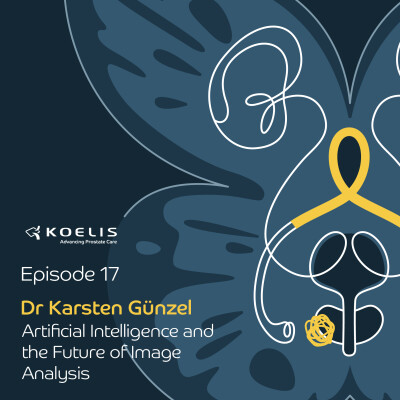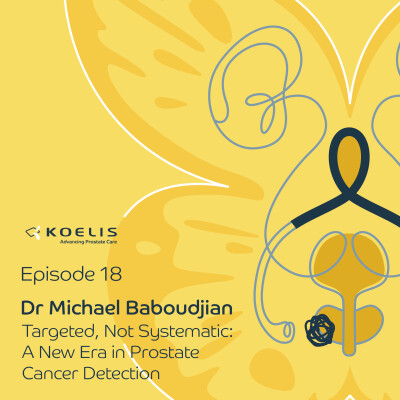- Speaker #0
This podcast is created by Coelis.
- Speaker #1
I would say artificial intelligence is a really new word and everybody is interested in it. Of course, it's a promotion fact. Patients really like to say, I use AI for your biopsy. And for my medical life, I would say it makes the biopsy much better because I'm more sure where to take the targeted biopsies. And I feel more comfortable with it because I know that I will not overlook any lesion and prostate.
- Speaker #0
Welcome to today's episode. We are talking about two things that might make you do a double take. Prostates and artificial intelligence. I know, it sounds like the beginning of a very niche sci-movie, but trust me, AI is playing a bigger role in prostate... cancer care than ever before. Imagine a world where machines can always scan faster than a doctor with a cup of coffee in hand. Yeah, that's the future we are heading towards. We'll break down how artificial intelligence is helping doctors make quicker, more accurate diagnoses, guiding treatments, and maybe even taking some of the guesswork out of prostate care. Though I'm not sure AI will ever be able to tell if it's really a prostate issue or just a stubborn case of middle age stress. And to talk about it, I have the great pleasure to welcome Dr. Gunzel from Germany, who uses AI in his daily practice. So buckle up as we navigate the world of AI and prostate cancer. Hi, Dr. Gunzel. We are really pleased to welcome you to our podcast Prostate Talk. We are live from the DGU. Congress, an important Congress in Germany. So how are you and how is the Congress going?
- Speaker #1
Hello. Yeah, we have a really long night and I'm really glad to be here today. And I'm really looking forward to talk with you about prostate and AI.
- Speaker #0
Thank you. Before to start this interview, could you please present yourself to our listeners?
- Speaker #1
My name is Carsten Günzel. I'm urologist from Berlin. I work in a private practice and One day a week in a hospital. And I would say I did a lot of fusion biopsies.
- Speaker #0
Thanks for this presentation. So now let's talk about prostate. First of all, I have heard that you are a fervent advocate of the transpirineal approach. Am I right?
- Speaker #1
I would say yes. We do a lot of transpirineal biopsies and we started three years ago. So I think we are really experienced with it.
- Speaker #0
Okay. And why did you choose to switch from transrectal to transperineal prostate biopsies?
- Speaker #1
I think everybody knows when he's doing a lot of biopsies, unfortunately, the transrectal way, you have a lot of post-operative infections. And I did the biopsies on a Friday and on Monday, it was always the same. Two of my 15 biopsies had an infection. This was a point that I said, Okay, let's start with the transrectal way and we choose a more Safe way for the patient.
- Speaker #0
And you mentioned the infection. What kind of infection can happen?
- Speaker #1
Little infection. It means just an urinary tract infection, but it could be a sepsis as well. And a sepsis is really a danger for the life of the patient. And this could be a big, big problem.
- Speaker #0
Okay. And as for today, would you get back to transvectoral approach sometimes?
- Speaker #1
Never. Never.
- Speaker #0
I'm sure it would help doctors who hesitate to change their... Practices. Something else come in my mind. I have heard that you are performing more than 1000 biopsies a year. Is that true?
- Speaker #1
You are right. Really?
- Speaker #0
1000? Oh my god! That means that you must prepare a lot of MRI images, right? What is your process for this preparation? Because it's really impressive.
- Speaker #1
Actually, this is a big task to perform all of the biopsies, of course, but as well to prepare the MRIs because as... Urologists, you have to deal with a really inhomogeneous quality of these MRIs. And I think for fusion biopsies, it's really essential to have a good MRI and to puncture the right lesions in the MRI.
- Speaker #0
And how do you be sure that the MRI that you will have from the patient is good? Do you work with a specific radiologist department at your hospital? What is the process?
- Speaker #1
Actually, in Berlin, the situation is that we have a lot of radiological institutes. And this means there are three, four really good and high quality radiological institutes with a really high quality of MRIs. But the rest is the quality is not really high. So you have to deal with this problem. And for this, you need a lot of experience or you use assistance software.
- Speaker #0
Interesting. During my research, I have noticed that you have recently published a study called Diagnostic Utility of Artificial Intelligence Assisted Transparency Biopsy Planning in Prostate Care Suspected Men. Could you explain to us how artificial intelligence can help you in these procedures?
- Speaker #1
Of course. Actually, the point is that a multi-parametric MRI is a really big data set. You have to evaluate a lot of data, a lot of sequences. And for this, you have to be experienced in the evaluation of these MRIs. We all know there are a lot of information in the MRI. And we know that computer-aided diagnostic systems have the possibility to analyze such a big data set really fast and maybe really, really sure. To be sure that you find the right lesion in the prostate. And this was a start that we thought about the idea. to use such a CID software, which is artificial intelligence assisted, to analyze our MRIs before a biopsy.
- Speaker #0
Very interesting. Does it impact the quality of the image in a good or maybe a bad way?
- Speaker #1
Actually, when we look in the data we published in the European Neurology Focus, we can see that it helps to analyze the pictures or the sequences of the MRI. What we found is that we... are really safe to find all of the right indices lesions and we will find more cancer, additional cancer maybe, which is overlooked by the radiological report. We'll find other additional lesions in the prostate with prostate cancer, which was not described in a radiological report. So I think it's really an advantage for the biopsy to use such a software.
- Speaker #0
Okay. and I'm thinking about the radiologist as well. What is the incidence on your collaboration with him?
- Speaker #1
Actually, I'm really experienced. This means I don't have a really collaboration with a radiologist. I always analyze the sequences by myself. But I think this collaboration is really important because first of all, we need a really good and proper radiological report. On the other hand, the radiologist need the feedback, the histopathological feedback, because if they have this, they can evaluate their radiological report to say, okay, it was the right lesion, which I described in the report.
- Speaker #0
So in another way, it's like a teamwork with your radiologist. Of course. Okay. And how does it impact your own daily work? This new software, this new technology,
- Speaker #1
I would say artificial intelligence is a really new word and everybody is... interesting in it. Of course, it's a promotion fact. Patients really like to say, I use AI for your biopsy. And for my medical life, I would say it makes the biopsy much better because I'm more sure where to take the targeted biopsies. And I feel more comfortable with it because I know that I will not overlook any lesion in the prostate.
- Speaker #0
Okay, very interesting. And how do you see prostate care management in the next few years? From diagnosis to treatment, how artificial intelligence, AI or just technology will impact your practice in the future?
- Speaker #1
I think the point is when we talk about prostate cancer, we know there is a really specialized or there are a lot of specialized therapy modalities. For this, we need a really accurate diagnostic. We should use all of the assistance programs, softwares, everything to make such a diagnostic, the initial diagnostic, as proper as we can. So I would say with a really accurate diagnostic, you can give the patient the best therapy modality to save his life or to make his life better.
- Speaker #0
So the heart of the matter is the diagnostic?
- Speaker #1
Of course, I would say.
- Speaker #0
And it also benefits for the patient at the end?
- Speaker #1
Of course, because we are more accurate. with it yeah so so it's better for the patient because he can be sure that we will find the cancer and we will find the cancer maybe with the highest grade what is really important definitely before handing this interview what
- Speaker #0
would you tell other physicians to convince them to use or at least not to fear artificial intelligence i would say there is still a little bit
- Speaker #1
distance to use an MP MRI for urologist. There are not really a lot of urologists who like to evaluate the MRI. With such an assistance program which is AI assisted you are able to evaluate the MRI by yourself and it's it's a training way of course but you have to do it and you will see when you get the assistance For example, buy a CAD software. You will get a really good start. to start to evaluate your own MRIs.
- Speaker #0
Thanks a lot for these precious informations. Talking about the future now, what are you currently working on? What are your plans?
- Speaker #1
Yeah, I think we are really at the beginning to use AI for prostate biopsy. I think there are not a lot of institutes who are doing this. So maybe this is something, it's always, it will take time until everybody would say, five years ago, everybody was doing a systematic transrectal biopsy. Then there was a shift to the transpirineal. MRI fusion biopsy and now we talk about the transpirineal AI-assisted MRI fusion biopsy in local anesthesia. I think there is a really fast development and it will take the next years to implement this in the daily work.
- Speaker #0
Okay, so let's meet next year to have a quick update.
- Speaker #1
I'm looking forward.
- Speaker #0
Sounds exciting. Before leaving Dr. Karsten, I'd like to ask my guest a suppressed christian yes i know so what is your song of the moment.
- Speaker #1
The song of the moment. Really difficult question. I would say it is Lynyrd Skynyrd with Simple Man.
- Speaker #0
Okay, great. So perfect. Thanks again for your time and with precious and your highlight. I hope you enjoyed this moment with us and maybe you will come back soon.
- Speaker #1
It was a great pleasure to talk with you. Thank you very much.
- Speaker #0
Thank you. Huge thanks to our dedicated listeners. If you enjoyed the podcast, make sure to subscribe for more captivating content. Your support means the world. If you found this informative, a quick favor, please. Drop up a five-star review. Your feedback helps us grow and deliver quality insights. Have topics you'd love us to cover? Share your ideas in the comments or connect with us on social media. Your input guides the future of Pros.Talk. Thanks for being a crucial part of our community. For more urology insights, visit Kallis.com. Stay tuned and see you next time.





